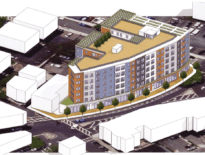Massachusetts should allow two-family construction and eliminate minimum parking requirements for residential construction, according to a panel advising the Healey administration on housing policy.
The Unlocking Housing Production Commission report was issued today by a 16-member panel appointed by Gov. Maura Healey in 2024 to recommend ways to increase housing production. Many of the recommendations would require the state Legislature’s approval and additional funding and will likely be controversial.
“The crisis we find ourselves in today was decades in the making but with the right strategies in place, we can change that trajectory,” Massachusetts Secretary of Housing and Livable Communities Ed Augustus said in a statement.
The administration estimates that 222,000 new housing units are needed by 2035 to rein in spiraling housing costs and meet the state’s economic development goals.
The commission called for statewide reforms challenging Massachusetts’ long history of local control over zoning decisions, including widespread prohibitions on multifamily development. The administration describes the report as a list of suggestions that the governor could pick from.
“Turning them into real-world solutions will require bold action and partnership between the public and private sectors, local officials and state legislators, businesses and residents. We hope leaders, policymakers, and community members will support this effort and help turn these ideas – and others – into action,” commission member Levi Reilly, head of development at Marcus Partners, said in a statement.
The report calls for statewide legislation that would legalize two-family construction statewide, and four-family construction on lots that have water and sewer service.
The city of Cambridge this month approved construction of 4- to 6-story residential buildings across the city, effectively ending single-family zoning as a strategy to attack high housing prices.
Expanding on the intentions of the MBTA Communities law, which requires multifamily zoning near MBTA service, the report said all 369 communities in Massachusetts should be required to create multifamily zoning districts. Unlike the MBTA Communities law, it doesn’t specify minimum district sizes or production goals.
The report also spotlights off-street parking requirements as a major impediment to housing development.
Off-street parking requirements can cost tens of thousands of dollars per space, the report states, driving up housing costs and making projects harder to finance. A recent MAPC study determined that most suburban communities have excessive parking requirements compared to how much parking is actually used in new developments. In December, the Somerville City Council eliminated off-street parking requirements for residential projects. In 2021, Boston dropped minimum parking requirements for 100 percent affordable projects.
But even highly urban, transit-connected communities still have high parking requirements, which the MAPC estimates costs $15,000 per space for surface parking, $40,000 per space for above-ground structured parking – as in a covered garage on a building’s first floor – and $80,000 per space for underground parking. A 120-unit building recently proposed in Chelsea at the intersection of three high-frequency bus lines must seek a variance from local rules that would require it to provide 221 parking spots instead of the 50 its developer estimates tenants will need.
To offset the impacts, communities would be required to set up policies encouraging alternative transportation such as carpooling, public transit and bicycle infrastructure.
Among the other key recommendations in the report:
Strengthen Chapter 40B: The state’s affordable housing zoning law should be streamlined to cut the timeline in which developers’ appeals of local boards’ denials are heard the Housing Appeals Committee, by expanding the committee’s staff. Currently, developers’ appeals can take several years to be decided by the panel.
Money for infrastructure: Lack of sewer service in rural areas inhibits high-density housing development. State subsidies for private water and sewage treatment systems, and a program enabling developers to connect extensions to existing sewer systems, could stimulate production.
Modular construction: The report also addressed financial challenges to housing starts driven by high construction costs and interest rates. It encourages modular housing construction through building code changes.
Elimination of Minimum Lot Sizes: Large minimum lot sizes are a barrier to housing production in many suburbs. Minimum lot sizes should be eliminated statewide, except in environmentally sensitive areas, subject to building, health and safety regulations, the panel recommended.
Building Code Reforms: Outdated building codes currently restrict multifamily development and should be updated to reflect modern construction techniques and costs. Massachusetts building codes currently trigger more costly standards when projects exceed 50 percent of the building’s value, making some projects infeasible. A new separate building code for residential renovation projects should replace the “all-or-nothing” 50-percent threshold. And the state building code should be updated to allow up to 24 units and 6-story buildings with single stairways. The current code limits single-staircase buildings to 12 units and 3 stories.








